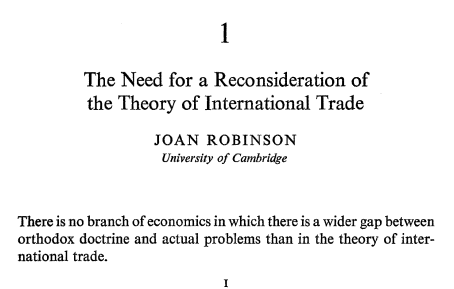A few important things to understand macroeconomics/political economy are: national accounts/flow of funds, fiscal policy, endogeneity of money—the financial system in general, the role of demand (or the reverse Say’s Law), behaviour of firms such as pricing, decisions to produce, decisions to hire labour, and international trade and globalisation.
After the economic and financial crisis which started in 2007, economists have conceded to some extent that they have been wrong and accepted some heterodox positions except the most important one: international trade.
Joan Robinson was in my opinion the first economist to truly understand all the issues need to make someone an economist of rank one.
Here’s the opening of a 1973 article:
In this article she tells the reader about how this problem leads to polarisation in the fortunes of nations:
We are now in the era of modern capitalism when every industrial country has a national economic policy of near-full employment and growth of GNP. Every industrial country wants a surplus on income account. ‘Export lead growth’ is the most convenient way of running modem capitalism. Who succeeds at any moment is accidental, largely depending upon historical circumstances and political and psychological influences. Success leads to success and failure engenders failure.
The most important point is that market mechanisms fail to resolve imbalances and this leads to divergence instead of convergence and causes a deflationary bias to the whole world. So in the absence of a market mechanism, an official mechanism is needed.
